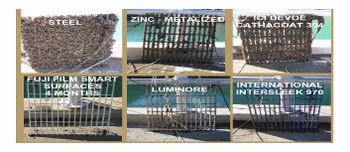Difference between revisions of "Quagga"
From Glen Canyon Dam AMP
(video) |
(add *[http://www.reviewjournal.com/media/slideshow/quagga_mussels/ 080509_Quagga Video Feed at Fish Hatchery]) |
||
| Line 30: | Line 30: | ||
=='''Quagga Mussel Archive'''== | =='''Quagga Mussel Archive'''== | ||
*[http://www.jsonline.com/story/index.aspx?id=767291 JS-Online_Quagga Video link_Affects to the shore line of Great Lakes] | *[http://www.jsonline.com/story/index.aspx?id=767291 JS-Online_Quagga Video link_Affects to the shore line of Great Lakes] | ||
| + | *[http://www.reviewjournal.com/media/slideshow/quagga_mussels/ 080509_Quagga Video Feed at Fish Hatchery] | ||
== References == | == References == | ||
Revision as of 16:36, 25 March 2014
This is the Quagga Mussle Information Page-
File:Quagga Pic.jpg
300px
Template:Quagga Mussel - Lower Colorado River Basin
Contents
Quagga Facts/ Trivia
What are the Currently Effective Control Methods Used for Mussels?
Methods of Control:[1] Oxygen Deprivation | Temperature Treatments | Exposure and Dessication| Ultraviolet Radiation | Manual Scraping | High-pressure Jetting | Mechanical Filtration | Passive and Barrier Filtration | Removable Substrates | Chemicals (Chlorine) or Molluscicides | Ozone | Antifouling Coatings | Electric Currents| Sonic Vibration | Natural Predators or Biological Controls| Bacteria (Pseudomonas Fluorescens)
Quagga Mussel Information
Zebra VS Quaggas:
- Quaggas are the dominant species of the two and will displace Zebras.
- Quaggas tolerate colder temperatures, and are more abundant at greater depths, reproduce at lower temperatures, and are more likely to grow in single layers and produce more patchy distributions.
- Unlike Zebras, Quaggas don't necessarily need hard substates to attach and grow. They can grow on the soft, silty bottom sediments.
Quagga Mussel Archive
- JS-Online_Quagga Video link_Affects to the shore line of Great Lakes
- 080509_Quagga Video Feed at Fish Hatchery
References
The Bureau of Reclamation- Quagga web-page
